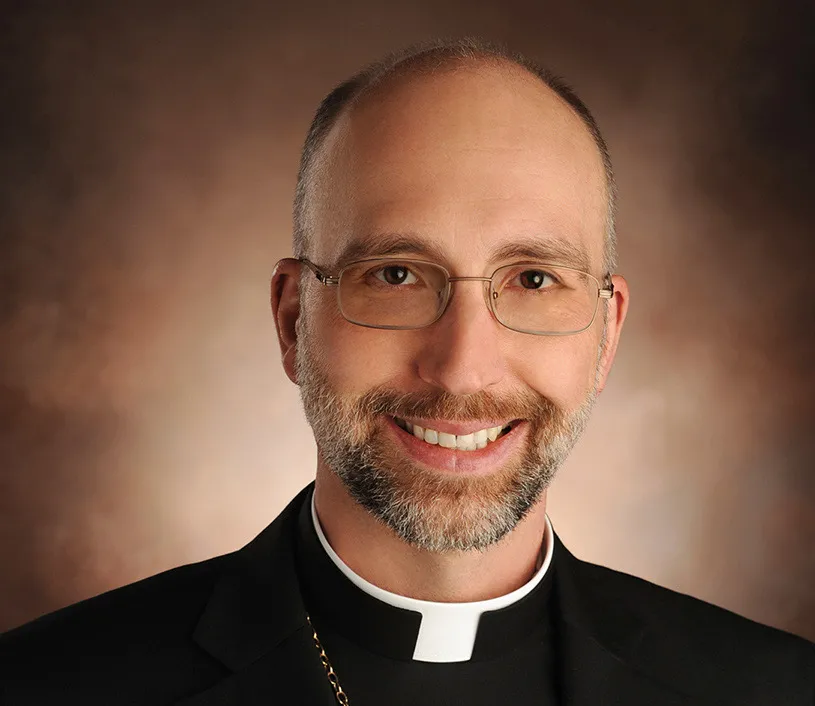
Denver Newsroom, Dec 16, 2021 / 10:55 am (CNA).
A document addressing the pastoral care of persons experiencing same-sex attraction and gender dysmorphia is about accompaniment and not exclusion, Bishop John Doerfler of Marquette has said.
“The whole document is not in any way meant to exclude people, but to help facilitate [a] journey to Jesus Christ in faith, a part of which does mean taking a look at our life, and if we’re living contrary to the Gospel message to address that,” Doerfler said in a Dec. 15 interview with CNA.
“Somewhere along that path of conversion and that journey of faith, each and every one of us needs to take a look at our own lives … and say there are things in our life we need to change.”
The Michigan bishop said that the 15-page document “should be really seen in that context.”
The pastoral instruction “Created in the Image and Likeness of God” was originally released July 29, but media outlets picked it up in early December. Much media coverage has painted the document as excluding people experiencing same-sex attraction or gender dysmorphia from the life of the Church.
One section of the document raises concerns that self-identified transgender people not be baptized without repentance. Doerfler said that section of the document needs to be read in the context of the rest of the document.
“The document contains several sections: the art of pastoral accompaniment; the meaning and purpose of human sexuality; general approaches to the accompaniment of persons with same-sex attraction and persons with gender dysphoria, then some guidance for some select pastoral circumstances,” he said.
“You can’t really understand the guidance for the select circumstances at the end apart from this whole art of pastoral accompaniment,” he said. “Taking it out of that context makes it appear very harsh.”

The Diocese of Marquette released the document in July to clergy and others involved in pastoral ministry and on the bishop’s webpage. Doerfler said the document was met with praise at the time.
“In general, I received gratitude from priests and others in the field for having some pastoral guidance in this area,” he said.
Doerfler said the document is not intended to serve as a complete treatment of the issue, but rather to provide basic considerations for pastoral care in these cases.
“It can’t nor does it solve every little question or every circumstance that might come up,” he said. “That’s impossible to put in a document. But it gives us a general orientation and a general approach to matters where we need to be guided by the Holy Spirit and pastoral prudence, in fidelity to what our Lord Jesus has revealed to us and [what] is taught by our beloved Church.”
In the document, the bishop describes pastoral accompaniment as “the approach and subsequent establishment of an ongoing relationship of trust with another person to walk together on the path of conversion to follow Jesus Christ in faith.”

Doerfler gave the example of Jesus’ encounter with the Samaritan woman, from the Gospel of John. Jesus engages the woman in conversation and treats her with love, respect, and dignity.
“He offers her this life-giving water, and it’s only when the woman finds this message that Jesus is giving attractive — when she encounters Him — that then the Lord begins to look at her life and some things that need some changing,” Doerfler said.
“He only gets to that point after there’s been this relationship of trust, where the woman begins to encounter the Lord Jesus and His love for her. It’s in that context that she grows into deeper faith and is able to take a look at her life.”
The bishop said there is a clear distinction between experiencing same-sex attraction or gender dysmorphia and deliberately acting on those feelings.
“It’s not a sin to experience same-sex attraction, and it’s not a sin to experience gender dysphoria,” Doerfler said. “It’s how we act on those experiences freely and deliberately that we need to take a look at. If we’re acting on those experiences in a way that’s contrary to the truth that Jesus reveals to us, that’s where we need to look at changing our behavior. But just those experiences themselves are not sinful.”
The bishop added: “That’s a very important distinction we have to keep in mind and it’s something that is, I think, often glossed over.”
In a recent interview with a Michigan news outlet, Doerfler said everyone is welcome in the Church.
“You’re most welcome. You’re most welcome,” he said. “I’ve had the privilege of counting among my friends persons with same-sex attraction, and you are most welcome. Jesus loves you with the depths of his heart and wants to come more deeply into your life.”
If you value the news and views Catholic World Report provides, please consider donating to support our efforts. Your contribution will help us continue to make CWR available to all readers worldwide for free, without a subscription. Thank you for your generosity!
Click here for more information on donating to CWR. Click here to sign up for our newsletter.




A very welcome DOCUMENT from Bishop Doerfler of Marquette….We might even hope that its use becomes widespread, say, through the two-year Synod on Synodality—where otherwise we can expect photo-op Fr. James Martin to deploy his storm troopers to kidnap the entire process of “walking together” (or whatever).
Do we see new/real LEADERSHIP in more USCCB members (personal “successors of the apostles”!), as the past manipulations by well-placed accommodationists blow away like a bad memory (outvoted 222-8 in approving Eucharistic coherence)? Chicago, the “windy city.”
But, too, what does it really mean when synodal outreach, itself, seems to redefine the Church (while said to be “not a new Church, but [only] a different Church”)? WHO are the synodal “people of God” with a possible wire-tap to the Holy Spirit (sensus fidei)?
The alternative and NUPTIAL ANALOGY of the Church as the Bride of Christ (the incarnational “being one flesh”) seems muddied even in Lumen Gentium (a point detected by Balthasar). The discontinuity between this accurate image (nn. 6,7) and a more corporate “people of God” (Nn 9f). The more autonomous and “transcendental Christology” proposed by Karl Rahner (so says Balthasar, “The Glory of the Lord, VII, The New Covenant”).
No longer the nuptial and sacramental MYSTICAL BODY OF CHRIST?
Is this nuptial nature of the Church, itself, also in the cross hairs of the earthbound, anti-binary, and anti-marriage homosexual agenda? Does Fr. Martin’s “bridge” slope in only one direction?
As for the synodal dimension of the nuptial Church, for it to actually work (rather than being aped as already in Germania’s “synodal way”) it seems imperative to CENTER the diocesan synods on our newfound “Eucharistic coherence.” And, then to liberate the diverse synod participants of all stripes with such Christian wisdom as the emerging new leadership (e.g., Bishop Doerfler) seem poised to supply.
Two-way “listening” through the synods? The Holy Spirit at work after all?
Bishop Doerfler needs to explain why LGBTQ+ whose sins “cry out to heaven for vengeance” are to be accompanied and included in the Church but traditional Catholics who love the ancient Latin Roman Rite liturgy are to be mocked, vilified, stigmatized, and excluded.
Accompaniment to or from Christ?
Does Bishop Doerfler know an active homosexual and does he really understand the difference between attraction and the consummated act when he pontificates for the first time to these individuals who often don’t draw a line demarcating desire and fulfillment?
Jesus approached people differently. He did not invite everyone to join his band of disciples. On occasion, Jesus turned away some seeking him.
Distinguishing groups of people (according to favored sin) for specific invitation is not something Jesus did.
Here we have a member of the hierarchy inviting persons who identify by unique disordered inclination aor sin. uch an act suggests a preferential treatment over people who keep their shame and their sin a personal humble struggle.
Where are the invitations to the alcoholics, the drug addicts, the slothful unemployed living on welfare checks rather than enter the job market? Where are the invitations to the proud and vainglorious stars of Hollywood or the actresses of porn? Where are the invitations to the greedy businessmen and women together with the avaricious angry smasher-grabbers and looters of others’ property? Also missing are invitations to angry road-ragers, spouse-beaters, aborters and child abductors. Where are all the other personally-identifiable-by-sin-categorical invitations?
Finally, why not invite the faithful traditional devout Catholics discriminated against by their own Church? Why not invite the unvaccinated?, the parents ignored and despised by those they pay to teach their children, and the otherwise disenfranchised non-elite deplorable of society?
The church looks desperately anxious to gain some societal worldly respect when it succumbs to evangelical methods FAR from those Jesus practiced. The Church hierarchy had itself a flock. Then they proceeded to lock out that flock.
To the woman caught in adultery Jesus said, “Go and sin no more.” He did not say that he wanted to come more deeply into her life.